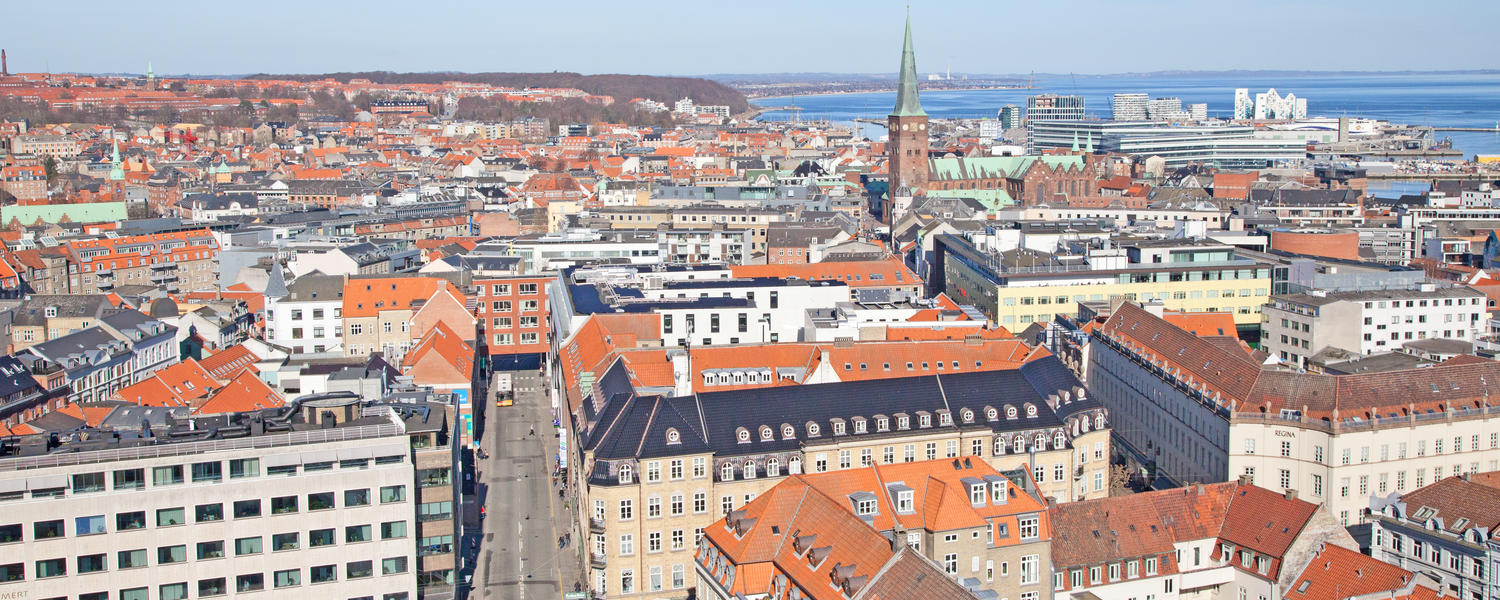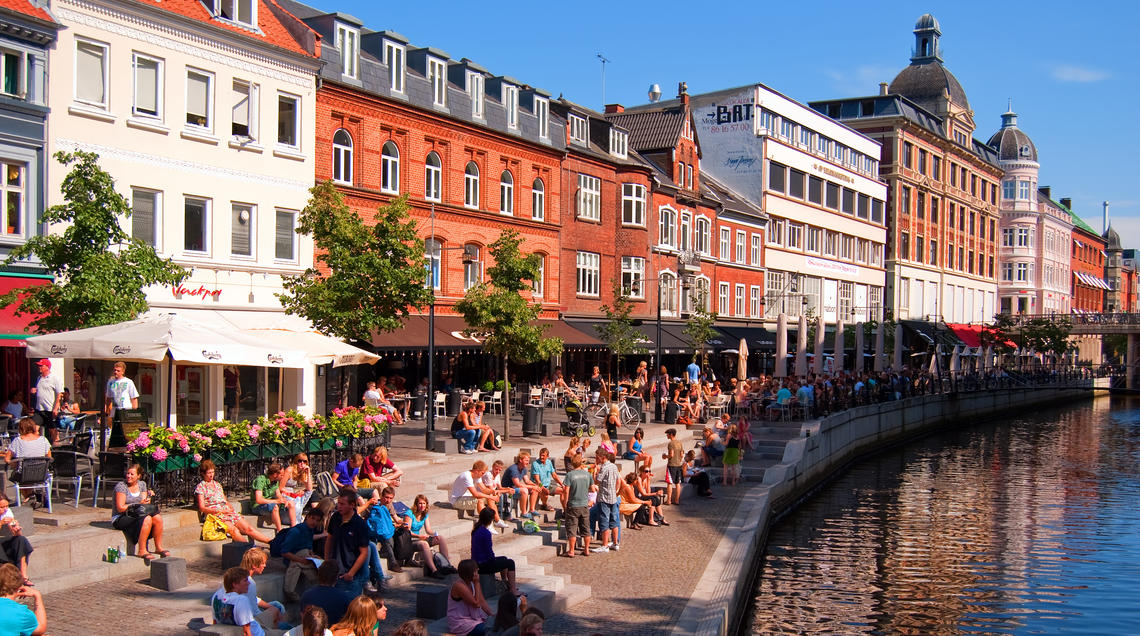
Aarhus Universitet - Science & Schulich Only
It would be shame to miss out on the experience of living in one of the best cities in the world!
With several world-class buildings, Aarhus is the 2017 European Capital of Culture. Aarhus Universitet (AU) is the highest-rated university in Denmark for student satisfaction, ranked in the top 150 universities worldwide, and is ranked as having one of the top 15 most beautiful campuses in the world.
Its current student population of about 44,500 enjoy research-based programmes and a stimulating environment: the walls of its main campus in Aarhus host the largest contemporary art collection in the city, and its buildings are considered an important icon of classic Danish architecture. AU is one of only 90 business schools worldwide with a Triple Crown accreditation.
Key information
Application information
Student experience

Take a lazy afternoon sitting along the canal near Den Gamle By (The Old Town) in Aarhus' historic city centre.
Program details
AU offers a wide variety of programs, however students are limited to studies in the programs listed below. Exchange students must limit their course choices to those offered in their program: see the Aarhus Faculty of Technical Sciences for Engineering courses or the Faculty of Natural Sciences for Science courses. Please note that while some mixing-and-matching is allowed, exchange students can only select courses in a maximum of two departments within their faculty. All courses must also be offered at the same campus.
Exchange students are expected to take 30 ECTS credits per semester. 1 UCalgary Half Course Equivalent = 6 ECTS credits.
Note: The science and engineering exchange agreement with AU falls under TASSEP. TASSEP is the Trans-Atlantic Science Student Exchange Program, a consortium designed specifically with the curricular needs of science/engg students in mind. Canadian science/engg students have access to a variety of European partners in the consortium.
-
Science students
Science exchange students at Aarhus may select courses from 1-2 departments. Available departments: Biology, Computer Science, Chemistry, Ecology, Geology, Physics, Mathematics, Nanoscience, and Neuroscience.
A limited number of English courses are available at the second/third year level. We therefore recommend that English-speaking students go to Aarhus in their third year or above. Fourth year students may be eligible to take master's level courses in English; please book an appointment with the exchange advisor to determine your eligibility.
To browse the courses offered by each faculty and for detailed information on course requirements & restrictions, click here. Most of the available science courses are offered under the "Faculty of Natural Sciences".
-
Schulich students
AU offers 3 course packages for engineering exchange students:
Urban Water for Civil Engineering - available both in Fall & Winter semester. The Fall semester runs until mid-January and students are required to stay through the end, so the Winter semester is recommended for students that need to return by January. The Urban Water courses may count as Group B Technical Electives towards the UCalgary Civil Engineering degree.
Software Engineering - available in Fall only. The Fall semester runs until mid-January but students can arrange for proctoring the exams online in Calgary (fees apply) in order to finish in December. Six 5-ECTS courses might be used as 4 ENSF Technical Electives.
Mechanical Design - available in Winter only.
Please note: although a couple of the programs above have already been reviewed by UCalgary, Schulich students are required to have a case-by-case assessment of their desired program and get an official letter of permission. Please contact an academic advisor in the Engineering Student Centre for course assessment.
Fall semester: August to January
Winter (Spring) semester: January to June
Please note that it is not possible to complete coursework/exams in December. Students who are only going for 1 semester and need to return to Calgary in January are encouraged to apply for a Winter (Spring) semester exchange. Full-year exchanges are also possible.
The exception to this is students in the Software Engineering program, who can arrange for proctoring the exams online in Calgary (fees apply) in order to finish in December.
-
Costs
Exchange students pay their tuition and academic fees to the University of Calgary. Other expenses are paid directly to the service provider.
It is recommended that students budget a minimum of 5000-5500 DKK per month to pay for accommodation and living expenses. Additional financial information can be found online under the "Money Matters" section of the FAQ.
Also, remember to include things like visas, insurance, vaccinations, etc. in your budget planning. Please Note: Danish visa applications may require travel to the Vancouver consulate to submit documentation and take biometrics.
For Aarhus cost of living vs. Calgary: Click Here
-
Funding
Did you know that you can take your UCalgary funding with you on exchange?
Since you remain a degree seeking student at the U of C while on exchange you remain eligible for any awards and scholarships you are eligible to receive from the university as well as student loans.Our office administers several awards, including the Global Access Fund (based on a funding-first model where students apply prior to committing to a global learning program) and the Global Learning Award (students apply after being accepted to a global learning program; the amount varies year-to-year as the money is split among chosen recipients). Students may only receive these awards once. Please see the funding page, linked below, for more information.
The type and availability of accommodation varies greatly between campuses. If exchange students apply for housing at their campus by the deadline, AU's International Centre will attempt to place them in university housing, which may be located on- or off-campus and may include private, semi-private, or shared rooms and facilities. If space is unavailable, the International Centre will advise students on finding accommodation in the private market. Prices may vary substantially depending on city and campus, but a broad estimation would sit between 2000-4000 DKK per month. See online for more general information about housing as well as housing details for each campus.
This exchange is open to regular, full-time students in the Faculty of Science and/or the Schulich School of Engineering at UCalgary, who have completed at least 1 full year (10 courses) at the post-secondary level, with a minimum cumulative GPA of 2.7 (B-).
Note: If your GPA is lower (in the 2.5-2.7 range) it may be possible for you to participate on this exchange. Please contact the UCalgary Global Learning Advisor to discuss, as exceptions are approved on a case by case basis.
No Danish is required for English-taught courses, but for studies in Danish, applicants must have a command of Danish at the B2 level according to the Common European Framework of Reference for Language (CEFR) at a minimum - certification of language proficiency may be required.
Do I have to speak Danish?
Most courses at AU for the first two years of university are taught in Danish while advanced-level courses are taught in English. We therefore recommend that English-speaking students go to Aarhus in their third year or above. Fourth year students may be eligible to take master's level courses in English - please see an advisor to determine eligibility.
Aarhus also offers opportunities to learn Danish!
What's so special about AU?
AU has three campuses. Its main campus is in Aarhus, the second-largest city in Denmark, which carries an eclectic mix of youthful communities, traditional winding streets, and internationally-acclaimed cultural events such as the annual Aarhus Festival, the largest of its kind in Scandinavia. The second campus is in the inland city of Herning, a vibrant community known for trade fairs and music festivals; it is also a primary centre on the Jutland peninsula railway network and therefore an easy area to travel to or from. The third campus is in Emdrup, a community on the outskirts of the large municipality of Copenhagen - an appealing cosmopolitan hub for those wishing to delve deep into Danish history.
For more information about Aarhus University, watch this video.
Check out this video about living in Denmark on the Aarhus page.
What resources are available for new students?
AU's International Centre runs an events programme called "Intro Days" at the start of each semester, which are designed to introduce students to Danish life. Each of AU's three campuses offers its own Intro Days as well as a unique "Survival Guide for Exchange Students" specific to its available faculties of study, the host city, and cultural climate.
The International Centre also oversees Mentor and Buddy Programmes, which pair up international students with Danish students from the same academic department for a welcoming, intercultural experience.
What supports or services are available at Aarhus?
The university offers disability support for those with temporary or permanent accessibility needs.
For information on accessibility and support services at campuses across Europe, please check out Inclusive Mobility. For city-specific services and places in Europe, the Jaccede interactive platform (website and/or smartphone app - both Android and iOS) also provides a searchable user-built database to identify important accessibility information of public places and locations.
Have questions?
The exchange advisor for this program is: Veronica V. Cardoso
How to Apply
Download the application guide
This PDF contains information on how to complete your application and what to do after you have applied.
Identify three programs of interest
We recommend applying for your top three programs for the priority application deadline, as placement may be competitive. We will assess your applications in ranked order.
Check requirements and deadlines
These may vary by program, so check the individual program pages and make sure that you are aware of any different application deadlines or eligibility requirements.
Start your application
Once you have gathered everything you need, you can begin your application!
Please note: Applications will not be considered complete until all required documents are submitted in full.
International travel presents challenges that may not be found when attending classes on campus. There may be a lack of resources, emergency services, hospitals, accessibility issues and/or demands on the physical and the mental self, all of which can challenge individuals when away from their usual support systems and structures. Adequate preparation is essential.
For this reason, it is imperative that you evaluate all aspects of your own physical, psychological, emotional and spiritual condition against the rigors of the particular global learning program you are selecting. If you are unsure of whether or not this program is a good fit for you and/or if you have any circumstances that could impede your enjoyment of the program, please contact us. Our Global Learning Advisors will be happy to assist in finding the best options for you and arrange any supports or accommodations necessary to ensure your success.
If you have or are seeking a certificate from Student Accessibility Services, you should provide this early to your Global Learning Advisor to ensure that the option that you are seeking can support your needs.
Please note: All participants must adhere to COVID-19 and other vaccination-related requirements for the destinations visited on this program. Failure to do so may have consequences such as being denied access to accommodation/housing, program activities, or to the host country itself.
